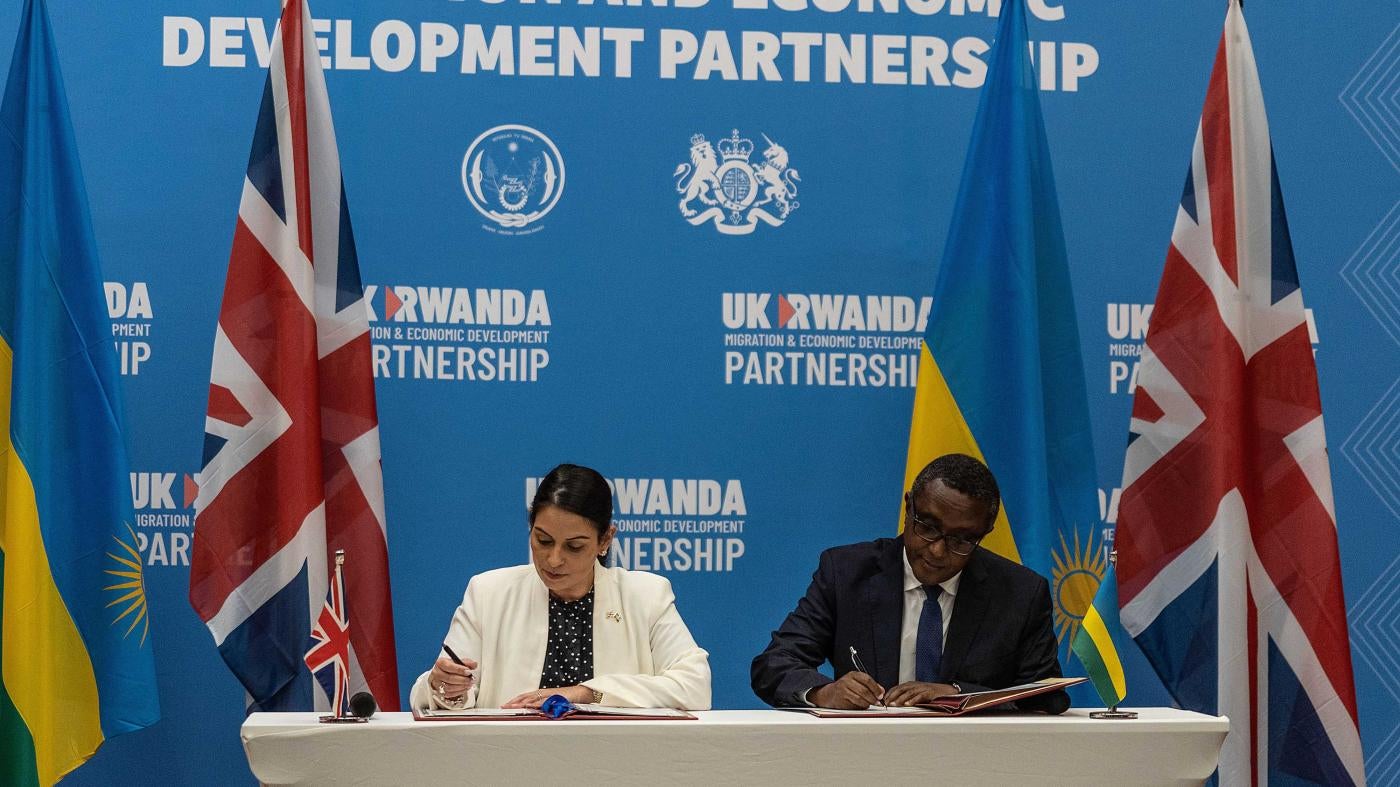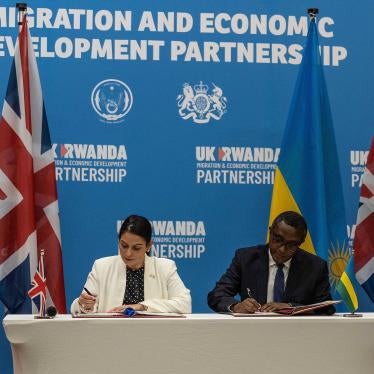Having seen its controversial plan to expel potential refugees to Rwanda temporarily blocked by the European Court of Human Rights, the UK government is at the Royal Courts of Justice in London this week to try and make the case that it should be allowed to proceed. The UK’s plan has been roundly criticized. The United Nations High Commissioner for Refugees (UNHCR) expressed concern of “serious, irreparable harm” to refugees being sent to Rwanda, whilst leaders from the Church of England said that the “immoral proposal shames Britain”. Human Rights Watch and other groups argue the proposal is a clear abrogation of the UK’s international responsibilities and obligations to asylum seekers and refugees.
Anthony Gale speaks with Yasmine Ahmed, UK advocacy director at Human Rights Watch, about the UK’s proposal and its possible ramifications, both for asylum seekers reaching the UK and for asylum and refugee rights more broadly.
Can you briefly explain the British government’s proposal?
The UK government has signed a memorandum of understanding (MOU) with Rwanda which essentially means that rather than fulfilling its legal obligations towards asylum seekers and refugees, it will send asylum seekers to Rwanda. It is a shameful attempt by the UK government to shirk its responsibilities. Instead of providing a safe haven to people fleeing conflict, oppression or persecution, the UK is seeking to expel refugees to a country where human rights abuses are widespread, and their safety cannot be guaranteed.
The government says that the measures are aimed at deterring what it refers to as “economic migrants” rather than penalizing genuine refugees. Isn’t that a good thing?
This simply isn’t true. Politicians, and some media, are keen to paint people arriving by boat as uniquely economic migrants with no claim to international protection. But research by the Refugee Council shows that the majority of those arriving to Britain by boat would likely be successful in claiming asylum and be recognized as needing our protection. Many of these people will have fled incredible hardship in countries like Syria, Afghanistan, or Yemen.
Under international law, your status as a refugee cannot be determined by your mode of transport, be it by plane, train, or boat. It is a made-up criterion that flies in the face of international standards.
What the UK is proposing is effectively a two-tiered asylum system that discriminates against one group of asylum seekers based solely on their mode of arrival. This is something we are seeing with people fleeing Afghanistan, who were the largest group amongst those arriving by boat at the start of the year. Failures of the UK government to adequately implement its Afghanistan visa schemes has meant that their so-called legal routes aren’t functioning properly, and individuals are left with no other option than to risk their lives through a dangerous journey over water, potentially in the hands of people smugglers.
If you are fleeing conflict or facing persecution, it is highly likely that you may have to use irregular modes of transport to escape to safety, especially when safe routes are unavailable or not working properly. This is something that is accepted in international law.
So why is this court case significant?
Not only will the High Court’s ruling decide whether the UK government can proceed with its cruel plan to expel people seeking protection, but it could set a precedent that undermines the international legal regime which provides protection for those fleeing persecution. If the UK, one of the primary architects of the 1951 Refugee Convention, no longer thinks the rules should apply, this could have a worrying ripple effect on how other countries respect or interpret this international protection regime.
You mentioned that human rights violations are widely documented in Rwanda, how is this relevant?
Because the government’s case is based upon the assertion that Rwanda is a safe country for asylum seekers to be sent to. This simply isn’t true. The Rwandan government has been widely criticized for its failure to comply with its international human rights obligations, including, quite recently, by the British government. This raises serious questions about not only whether this process will adhere to international standards, but also, more importantly, whether expelled asylum seekers will be safe in Rwanda.
In 2018, Rwandan soldiers shot and killed 12 refugees who were protesting a cut in rations, and many more were arrested for supposedly painting the country in a bad light.
Rwanda is also a country where political opposition is repressed, journalists are routinely imprisoned, and unlawful detention, torture, and extrajudicial killings have been well documented.
But these are only the human rights violations we know about. You have to factor in that Rwanda is an incredibly repressive state where the penalties for speaking up are severe. Human Rights Watch knows of an individual who spoke with an international organization and was later charged with “Spreading false information with intent to create a hostile international opinion against the Rwandan state.” Can the UK government really believe that people will feel safe to report possible abuses when the Rwandan government has imprisoned people for criticizing the government of Rwanda abroad?
Can the UK government rely on international bodies to ensure the safety of people sent to Rwanda?
Suggestions that international bodies can guarantee meaningful oversight ignores reality. Such efforts are unlikely to be successful. Even the United Nations Subcommittee on the Prevention of Torture had to cancel its visit to Rwanda in 2018 – the only time it has ever canceled a visit – due to interference from the government and fears around the potential consequences for victims they spoke to. And the International Committee of the Red Cross (ICRC), which monitored prison conditions in the country, decided to discontinue monitoring when the Rwandan government refused to allow them to apply Red Cross standards.
The fact is, the Rwandan government doesn’t welcome any sort of scrutiny, either internally or externally, so it is going to be almost impossible for the UK government to effectively monitor the safety of asylum seekers and guarantee their safety.
Is there anything else you would like to add on this issue?
I think it is really important to stress how this decision could impact on the wider international context, which is the incredibly concerning trend of countries attempting to shirk their responsibilities to refugees and asylum seekers. We have already seen this happen in Australia, where the offshoring of asylum seekers and refugees to Nauru and Papua New Guinea resulted in terrible abuses, including suicide attempts. Since the policy began in 2013, 12 people have died. Also, it appears as though Denmark is hoping to follow Britain’s lead by sending asylum seekers to Rwanda, and both the United States and EU have introduced policies that are geared towards deterring refugees or containing them outside of their borders.
If the UK is successful in the courts, the ripple effect could seriously undermine international standards and shift the goalposts on what is deemed acceptable when it comes to the protections we offer asylum seekers and refugees. This isn’t just a case that will impact on those coming to the UK: its impacts could be wide reaching.
We have seen with the response to the Ukraine crisis that it is possible to treat refugees humanely and with respect. Instead of a race to the bottom, governments should be using Ukraine as an example of how a fairer, more humane system is possible.
*This interview has been edited and condensed.



